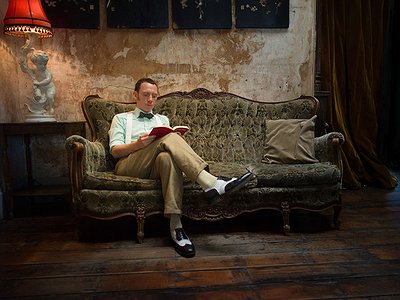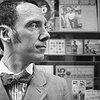With more and more musicians creating than ever and more and more of these creations being released, what does this mean for you as an artist in terms of originality? What are some of the areas where you currently see the greatest potential for originality and who are some of the artists and communities that you find inspiring in this regard?
Well I’m not sure whether it’s more ‘musicians’ creating as you put it, or more DJs. To me it sounds like more DJs or just people in general creating, due to technology and the ease of it all now. That aside, it’s even more crucial for me and others to find our own voices and sound. This will only come about by studying the music itself directly. Even if it’s just some basic lessons of piano or guitar, whatever. The point is, it’s down to us to learn and internalise it. Otherwise it’s drawing in notes and hitting the chord button on Cubase to ‘try’ and get a piece of music together - its lazy!
Originality will come from fusing musicians and styles with all this technology. It's not one or the other, they can live and breathe in the same space. There are a lot of great young musicians and producers coming through, especially in the London jazz scene. My friend Ben Hazleton (Double Bass) plays at The Haggerston on a Sunday night. They have an open session in the second set where a lot of young musicians play, and they all sound great. It’s an inspiring community, a lot of them are at college learning and studying music, getting the chance to get out and ‘blow’ with some other more established musicians on the scene.
Artist-wise off the top of my head currently, Jaimeo Brown, GoGo Penguin, Polar Bear, Sons Of Kemet, Kamasi Washington, Floating Points, Brame & Hamo, AtJazz, Fouk, Chaos in CBD are all doing really interesting stuff and pushing it forward and not even in a ‘strict’ jazz sense. The fusions of sounds, instruments, styles and rhythms deliver really interesting and forward-thinking results.
How strictly do you separate improvising and composing?
Most of my ideas come from improvising and trying to be free. Usually a hook, a chord, or an idea will appear and I’ll then start directing the track. I kind of see it as all one process.
How do you see the relationship between sound, space and composition and what are some of your strategies and approaches of working with them?
A lot of the time, those choices seem to appear in the mixing or production stage. The sound of the room that the instruments were recorded in, always plays a big part. One thing that I did on the album, which was new for me, was to send any virtual sounds out and record them in my room again with a mic set up and mix them back into the track. This kind of helped make them feel more physical and natural. One of my bug bears with a lot of dance music is that it sounds so flat because it’s all done in the box, there's no character.
What's your perspective on the relationship between music and other forms of art – painting, video art and cinema, for example – and for you and your work, how does music relate to other senses than hearing alone?
There’s obviously a huge connection to other forms of art. They inspire one another and feed into each other. We have a need to create and connect on a deeper level, sometimes beyond words and language.
I find it interesting that music can make a visual image or scene feel even more powerful and intriguing if done well. I have even sometimes been able to recall the smells and touch of an environment that had an experience with music connected to it. Whether it's as far back as childhood or in later years, there is certainly a very strong cognitive connection with music that goes very deep.
What's your view on the role and function of music as well as the (e.g. political/social/creative) tasks of artists today - and how do you try to meet these goals in your work?
Getting older, I realise that the role and function of music can have a strong effect on people. It’s the artists’ duty to challenge these areas and also music itself, constantly. When I was younger I didn’t really care, but I guess I viewed myself as more of a DJ/producer back then.
One the main things for me on this new album was to express my perception of the world, while still allowing the listener to define and create their own interpretation of the music.
When I look back, most great artists at some time or another in their career challenge the norm, the status quo. There is also the ‘spiritual’ aspect of it all. Is music healing? Can it help with mental illness?
From some of the texts I’ve read, it would suggest it is and can. My small insight and research into the various tuning systems have an impact on this also. A ‘pure fifth’ with the correct ratio of 3:2 (hemiola) is pretty powerful. I don’t doubt that in ancient times this was, at least, one of the primary purposes of music over and above entertainment. This is an area that I want to explore more in future.
Listening is also an active, rather than just a passive process. How do you see the role of the listener in the musical communication process?
I agree, it can be both active and passive. It really depends on the listener and where their mood or mind set is at the time. Most of us, myself included, don’t really listen most of the time. We’re too easily distracted. When we engage actively, it can be a profound experience. However, with more distractions now than ever before and the dawn of the ‘Augmented Human’, it all seems to be more about uploading pictures and talking about music than actually actively listening to it. You see it at shows all the time, and coming from a time when mobile phones did not exist, it makes for uncomfortable viewing. People are missing out on engaging fully in the performance. The sadist in me kind of likes the idea that there should be a database of all known offenders, who are banned from venues until they have been strapped into a chair and forced to listen to Morton Feldman on repeat till they surrender and promise not to get their phone out at a gig ever again.
Reaching audiences usually involves reaching out to the press and possibly working with a PR company. What's your perspective on the promo system? In which way do music journalism and PR companies change the way music is perceived by the public?
The current promo system is a mess. From a DJ perspective, people are inundated with promos on a daily basis. How much actual physical time can one make to really listen to all this stuff? You get these cookie-cutter responses to a record that you've spent hours making and putting love into.
It seems as the online juggernaut gets bigger and bigger, blogs want more exclusive content to help drive traffic to there site. It will implode if it hasn’t already. It’s not a sustainable method.
Of course as always, journalism can shape views and trends along with PR companies pushing in the same direction. From speaking with friends who buy music and are not part of the industry, the biggest problem they have is that there is just so much stuff. They don’t know or have the time to find out what’s really great. They tend to fall back on stuff that forced on them via the usual means of PR and media.
The natural filter of independent record shops has somewhat gone.
This was always a good gage and a natural filter, as people would have music recommended to them by someone who was actively seeking out good music to stock for their shop. It would come at a financial cost if a shop stocked everything like today's online stores, so in some ways music had to be of a certain quality. Natural gatekeepers if you like. Maybe online stores need to be stricter with the content they chose to stock. I’m not sure what the answer is.
Do you have a musical vision that you haven't been able to realise for technical or financial reasons – or an idea of what music itself could be beyond its current form?
Mainly ideas involving huge string sections or an orchestra in a cave, but there is still time for that. I hope!
Visit Tim Deluxe's soundcloud soundcloud.com/tim-deluxe
You can buy Tim's new album The Radicle here



